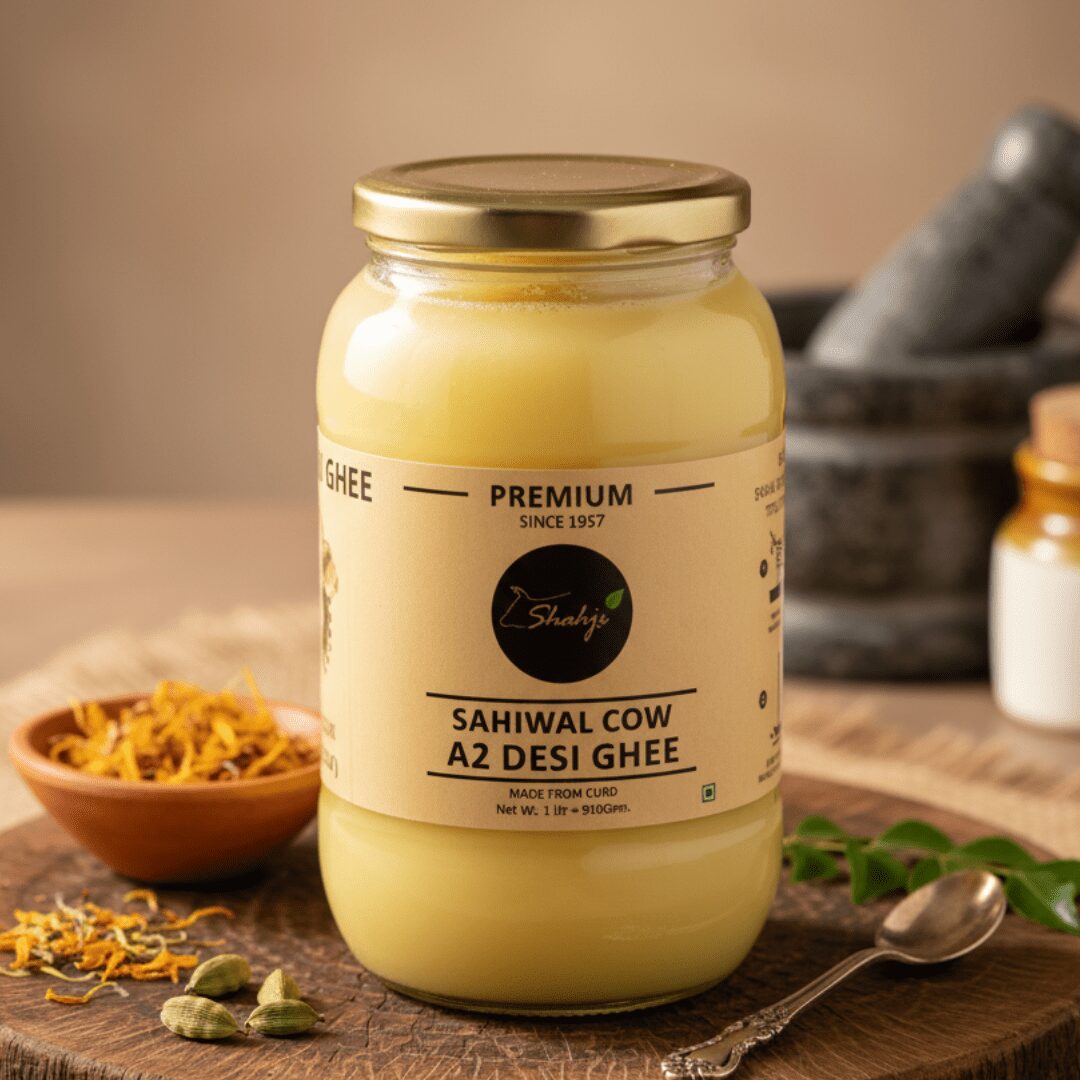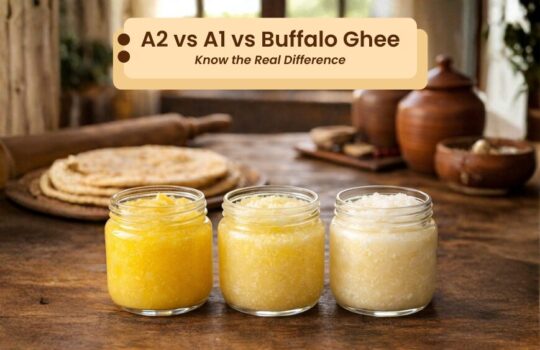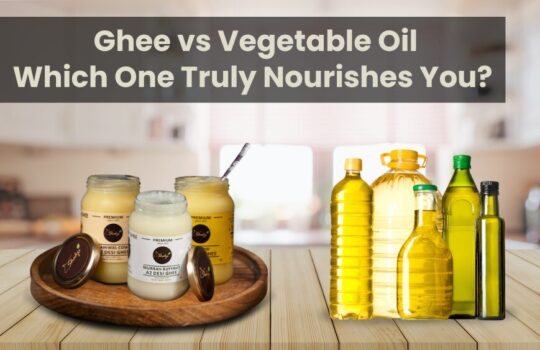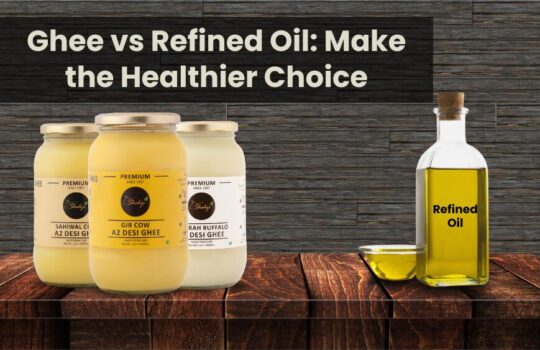Ghee Vs Coconut Oil: Which Is Better & Healthier?
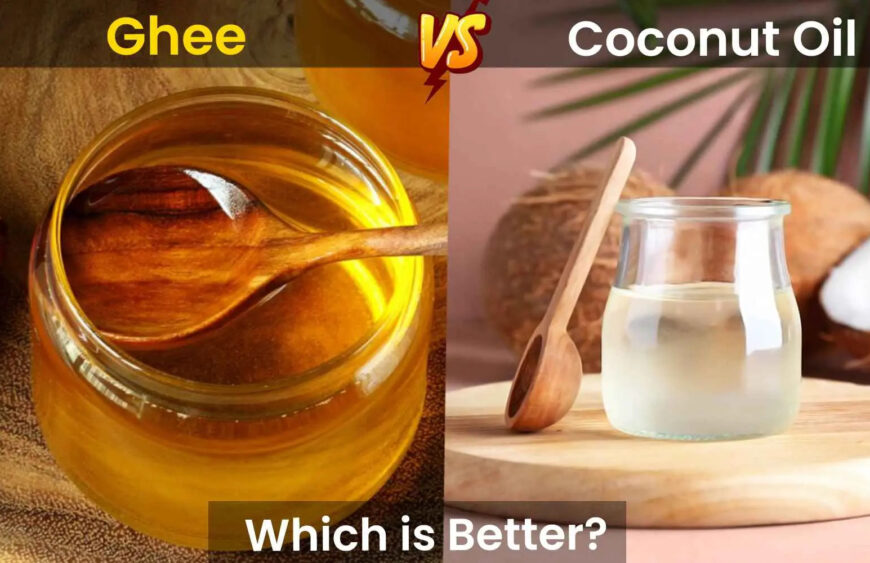
Both desi ghee and coconut oil are miracle foods with immense benefits for overall health. They are also ritualistically important and have been part of the Indian tradition since times immemorial. However, pure desi ghee scores over coconut oil in nutritional advantages. Let’s explore Ghee Vs Coconut Oil: Which Is Better & Healthier?
Nutrient Composition of Ghee Vs Coconut Oil
Desi Ghee |
Coconut Oil |
| Ghee contains saturated fats, protein, calcium, fat-soluble vitamins, and minerals. | Coconut oil mainly contains Saturated Fats and Vitamin K. It doesn\’t have any fibre, minerals, or proteins. Its benefits mainly arise because of the medium-chain triglycerides it contains. |
| A tablespoon of ghee = 112 calories (12.7 grams of fat)Saturated fat content = 7.9 grams | A tablespoon of coconut oil = 117 calories (13.6 grams of fat),Saturated fat =11.8 g. |
Health Benefits of Ghee and Coconut Oil
Benefits of Ghee:
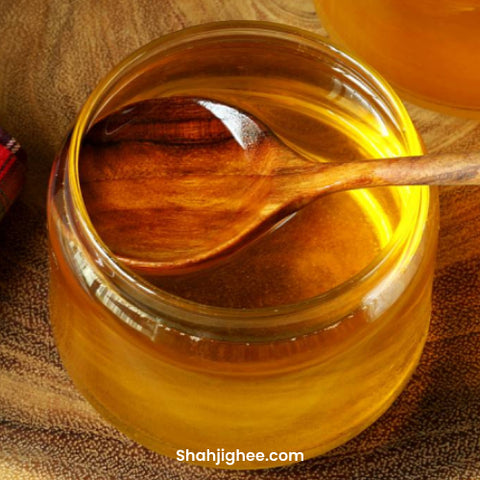
- Ghee increases energy levels, because of its high-calorie and healthy fats, butyric acid, and medium-chain triglycerides
- Ghee has antioxidant effects via fat-soluble vitamins and minerals and the functional component butyrate, and it protects the body against mild fever, acidity, common cold, nose, throat, and chest infection.
- Ghee promotes gut health, digestion, and immunity. Its butyrate helps in relieving abdominal pain, bloating, and cleaning intestinal walls. Ghee aids bowel movement. It prevents constipation and neutralizes stomach acidity.
- Ghee is a cooling agent good for eye health because its essential fatty acids Omega-3 and Omega-6 remove dryness and fatigue of the eyes.
- Ghee is anti-inflammation because omega-3, omega -6, butyrate, conjugated linoleic acid, and calcium reduce swelling and burning sensation. So ghee application is useful in conditions of arthritis and osteoporosis.
- Ghee promotes brain functions by providing sufficient fat to the cells in the brain. The fat hydrates the cells, improving learning, memory, and concentration. Vitamin E provides immunity against brain- disorders.
- Ghee is good for skin health: vitamins D, E, and calcium provide deep hydration to the skin cells. Hence ghee makes skin soft and reduces wrinkles and pimples.
- Ghee is good for the heart through omega-3 fatty acids, which help in reducing bad cholesterol.
- Ghee strengthens the root of the hair and stops the problem of dandruff.
Benefits of Coconut Oil:
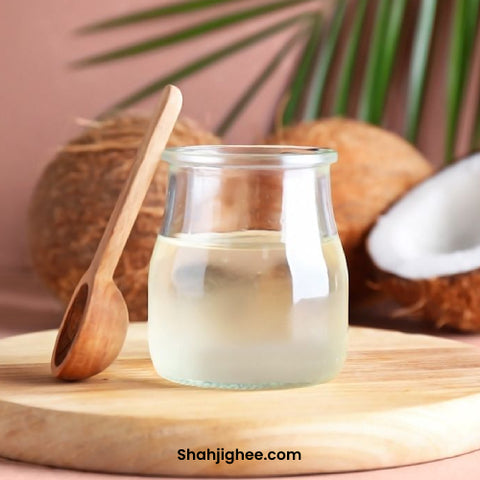
- Lauric acid in coconut oil makes it antifungal and antimicrobial.
- Coconut oil is also considered good for oral health because of lauric acid.
- Due to the presence of medium-chain triglycerides, the digestive system easily breaks down coconut oil. This increases metabolism and aids weight loss. Digestive issues are also solved.
- Coconut oil is good for hair health owing to its fat content.
- Coconut oil is used as cooking oil, especially in southern India.
- It is also beneficial for the skin and naturally lubricates the skin.
Also Read: A1 Ghee Vs A2 Ghee: Which Ghee is Better?
Why Choose Ghee over Coconut oil?
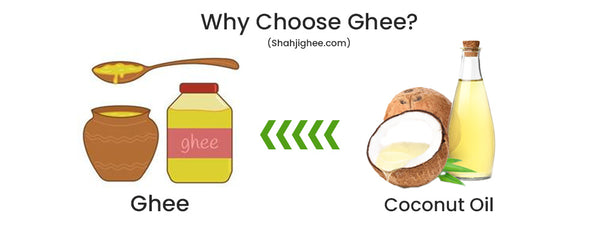
Both ghee and coconut oil are calorie dense and composed mostly of saturated fats. However, ghee mainly has short-chain fatty acids and some medium-chain triglycerides. Coconut oil is primarily composed of medium-chain triglycerides. So what makes ghee the better food?
1. Ghee has Less Saturated fat
Coconut oil contains 90% saturated fat while Ghee has only 50%. Ghee is less calorie dense than coconut oil and doesn\’t create nausea or bloating that coconut oil can cause in some.
2. Ghee has a Higher Smoke Point
The smoke point of coconut oil is 350º F which is less than ghee which has a smoke point of 485º F. Heating fats beyond the smoke point breaks them down and they release free radicals which cause oxidative stress. This can lead to many ailments including cardiovascular diseases and cancer. The beauty of ghee is that it doesn\’t break down easily.
3. Ghee Contains More Essential Vitamins And Micronutrients
Grass-fed dairy products like ghee have a higher concentration of fat-soluble vitamins A, D, E, and K as well as conjugated linoleic acid than coconut oil.
4. Ghee Contains Butyric Acid Which Coconut Oil Doesn’t
Butyric acid is pro-digestion, anti-inflammation, and acts against irritable bowel syndrome. Coconut Oil however lacks Butyric Acid.
5. Ghee has a Heavenly Buttery Flavour
Ghee can easily be a part of your dish. It will either enhance the taste due to its buttery flavour or will be a part of it, never overpowering the taste. Coconut oil lacks this versatility because of its specific, coconut flavour that overpowers a dish.
Also Read: Buffalo Ghee Vs Cow Ghee – Which is Better?
While both of them are good for consumption, you can clearly see that ghee is indeed a superfood. Bear in mind not to overindulge in ghee consumption. Eat moderate amounts of it.
Only eat pure desi ghee for maximum benefits. Try out Shahji Desi ghee and see how even a little amount can make a difference in your life.
A2 Gir Cow Ghee
1 LTR
Best Price: ₹2125 with Coupons

A2 Gir Cow Ghee 2 Litre Combo Pack
Best Price: ₹4125 with Coupons
A2 Sahiwal Cow Ghee
1 LTR
Best Price: ₹1619 with Coupons

Frequently Asked Questions – FAQs
What is the difference between ghee and coconut oil?
Ghee and coconut oil differ in their fat composition. Ghee contains short-chain fatty acids and essential fat-soluble vitamins like A, D, E, and K. Coconut oil is rich in medium-chain triglycerides (MCTs) and lauric acid, known for their antifungal and antimicrobial properties. Ghee is more nutrient-dense, while coconut oil primarily supports metabolism and digestion.
Which one has fewer calories, ghee or coconut oil?
Ghee contains 112 calories per tablespoon, while coconut oil has 117 calories per tablespoon. Ghee is considered less calorie-dense due to its lower saturated fat content, making it a slightly better choice for those looking to reduce overall calorie intake.
How does the smoke point of ghee compare to coconut oil?
Ghee has a higher smoke point of 485°F, making it more stable at high temperatures, ideal for frying and sautéing. Coconut oil’s smoke point is 350°F, which means it can break down at higher heat and release harmful free radicals. Ghee is better suited for cooking at higher temperatures.
Does ghee offer more vitamins than coconut oil?
Yes, ghee is richer in fat-soluble vitamins such as A, D, E, and K, which are vital for immune function, skin health, and bone strength. Coconut oil lacks these vitamins, making ghee a more nutrient-dense option.
Which is better for heart health, ghee or coconut oil?
Ghee, especially grass-fed ghee, contains omega-3 fatty acids, which are beneficial for heart health and help reduce bad cholesterol. Coconut oil, while beneficial for metabolism, is higher in saturated fats, which may increase bad cholesterol if consumed excessively. Ghee is a healthier choice for heart health in moderation.



